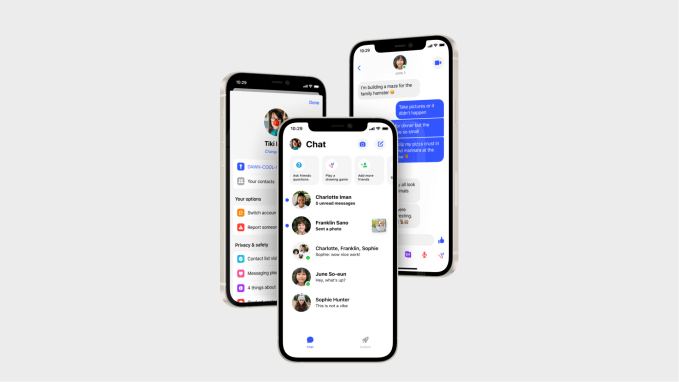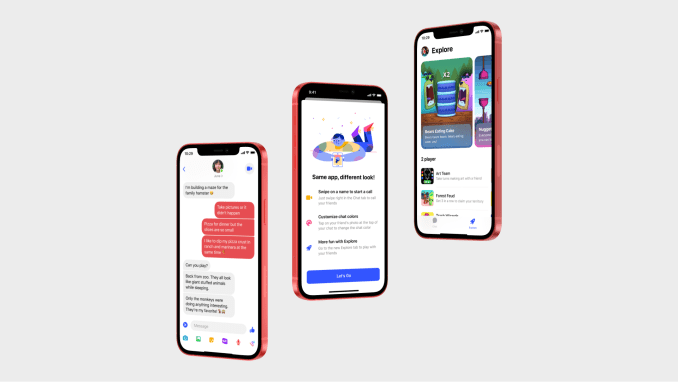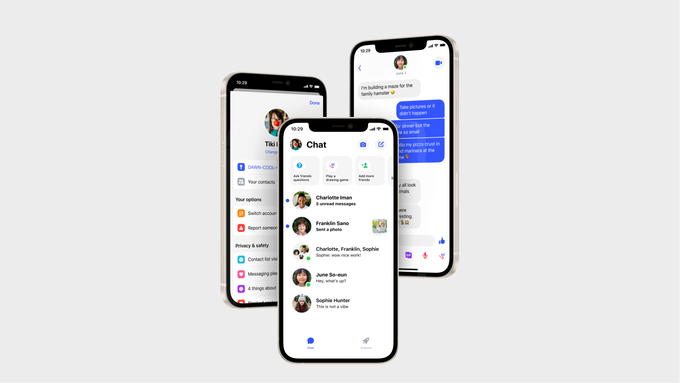Facebook today is rolling out an updated version of its Messenger Kids app with the goal of making it easier for kids to interact with their friends and family, navigate the app, and personalize their experience with features like custom chat bubble colors. The redesign also gives the kid-friendly app a look-and-feel that’s more like Messenger itself.
The updated app does away with the larger, colorful blocks that would flash when messages arrive for a more traditional messaging app design where chats are stacked in a vertical list. The child’s unread messages, now at the top of the inbox, are in bold with a blue dot next to them to call the eye’s attention. Media and message previews have also been added, too, allowing kids to more easily see updates for their conversations.
The redesign introduces new navigation with two dedicated “Chat” and “Explore” navigation tabs at the bottom of the screen, allowing for kids to switch between their conversations and the other in-app activities the app provides, like its mini-games
And with a new swipe gesture, kids can start a call from their inbox.
Finally, the update introduces a new option to personalize conversations, including both individual and group chats, with a custom chat bubble color.

Image Credits: Facebook
Facebook refers to the update as a “test,” but the changes here are not small tweaks to the layout, navigation or feature set — they’re a revamp. That makes it less likely that this is just some experiment that will later be rolled back based on user feedback. Instead, by referring to it as a test, Facebook gives itself more time before committing to a global rollout.
The company says the new features will first roll out to kids using iPhones in the U.S. and Canada. The update will later expand to other devices and markets in the months ahead.
The changes arrive shortly after Messenger itself received a significant update of its own, which included a visual makeover and new features, including support for chat themes, custom reactions, selfie stickers and vanish mode, in addition to support for cross-app communication with Instagram users. Those updates could have led to the Messenger Kids makeover as well, given there’s likely some underlying messaging infrastructure that’s shared here.
The Messenger Kids app has been steadily updated in the years since its launch, most recently with a big explainer on what Facebook is doing with all that data it’s collecting.

Image Credits: Facebook
Parents should be aware this app today collects a lot of personal information, including names, profile photos, demographic details (gender and birthday), a child’s connection to parents, contacts’ information (like most frequent contacts), app usage information, device attributes and unique identifiers, data from device settings (like time zones or access to camera and photos), network information and information provided from things like bug reports or feedback/contact forms. While some of this does allow the app to properly function, there’s also concern from some parents about how this data is really being used.
While the app does offer a suite of parental controls that make it easier for parents to monitor and restrict how and when their children chat online, Messenger Kids’ privacy policy still leaves itself a lot of wiggle room about how the data may be used to “evaluate, troubleshoot, improve, create, and develop our products” and be shared with other Facebook Companies. Parents should carefully weigh the risks of allowing their child to use a Facebook product with the conveniences of being able to use an app with a robust set of parental controls.






